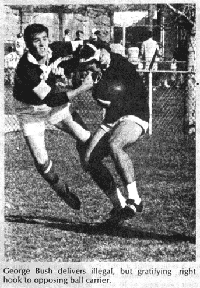 Just in time for independence day, a reminder of what makes us Americans (wmv):
Just in time for independence day, a reminder of what makes us Americans (wmv):
Chris Matthews:…There is another side to this argument. Let me ask you: Do you believe that people who fight us as terrorists deserve Geneva Convention treatment?
Lt. Cmdr. Charles Smith: It’s not whether they deserve it or not, it’s how we conduct ourselves. It has to do with where… If we say that our opponent can cause us not to follow the rules any more, then we’ve lost who we are. We’re the good guys. We’re the guys who follow the rules. The people we fight are the bad guys. And we show that every day when we follow the rules regardless of what they do. It’s what sets us apart. It’s what makes us great. And in my mind, it’s what makes us undefeatable.
Good guys follow the rules.
I’ve been thinking a lot lately about what following the rules means. Part of this comes of the comments (now nearly 250) on an earlier post related to plagiarism. Several people in that post suggested that people who break the rules come out ahead. Plagiarism has shown up in newsrooms and on book editors desks a lot more frequently lately, and there is a growing awareness of professors being caught up in plagiarism scandals, as well as other forms of cheating.
What about Batman?
The reason for this unease is that I have always been one willing to break the rules. I believe strongly in the ends justifying the means, when those ends represent a greater good rather than merely personal gain. That some rule-breaking leads to personal gain does not particularly bother me, as long as the sum good to society is positive. That’s why I feel vindicated in speeding at times, and why I am not particularly vexed by many kinds of (not-for-profit) music piracy.
 I think part of the problem is that I share with our current president a deep arrogance. The rules, particularly the rule of law, have emerged because they are an effective way of dealing with social problems. While breaking the rules, as suggested by the caption at left, might feel satisfying, it is unjust not only because it violates an assumed agreement, but because it does so to an individual’s gain. Likewise, while vengeance may be a part of the legal structure, it distances it from its most obvious excesses. Consider, for example, a recent case in which a vigilante crowd took the “law into it’s own hands”, and as a result perpetrated a great injustice.
I think part of the problem is that I share with our current president a deep arrogance. The rules, particularly the rule of law, have emerged because they are an effective way of dealing with social problems. While breaking the rules, as suggested by the caption at left, might feel satisfying, it is unjust not only because it violates an assumed agreement, but because it does so to an individual’s gain. Likewise, while vengeance may be a part of the legal structure, it distances it from its most obvious excesses. Consider, for example, a recent case in which a vigilante crowd took the “law into it’s own hands”, and as a result perpetrated a great injustice.
Principled rule breaking
Which gets us to the “spirit” of the law (or of the rule). The police abuse their legal power far more often than is right. A friend has recently fought with the law, and–not surprisingly–the law won. To be more accurate, the charges levied against him have mostly been dropped, but he had to suffer the consequences of this abuse of power (arrest, detention, expense, physical harm), and so it’s not exactly true that it “all worked out in the end.” Sometimes, following the rules harms not only you individually, but is a net setback for society. So how to decide?
I’ve read a little on ethics, and a bit on law, and the truth is I don’t have an answer. I do get the feeling though, that socially we are more forgiving of those who break the rules now than we have been in the past. As I’ve said, that doesn’t particularly bother me–but what does bother me is that people are breaking the rules largely out of sloth or avarice. And I think many of those who support the president do so in part because he manages to break the rules to his own benefit so often.
It seems like as a nation we have lost something of our moral compass. I am a social liberal, but I arrive at that position through a principled view of what is important to us as a nation. One of those things is respect for the law, and respect for the ideals that form that law. And for this, Charles Swift deserves to be celebrated as a national hero.
internal_server_error